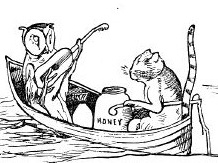Five Childhood Lyrics
| Five Childhood Lyrics | |
|---|---|
| Choral music by John Rutter | |
 "The Owl and the Pussycat", 1888 illustration by Edward Lear, whose text is set in the second song | |
| Text | Nursery rhymes |
| Performed | 1973: London |
| Published | 1974: Oxford OUP |
| Movements | five |
| Scoring | SATB choir |
Five Childhood Lyrics is a choral composition by John Rutter, who set five texts, poems and nursery rhymes, for four vocal parts (SATB with some divisi) a cappella.[1] Rutter composed the work for the London Concord Singers who first performed them in 1973.[2]
The five movements are:[2]
- Monday's Child
- The Owl and the Pussycat
- Windy Nights
- Matthew, Mark, Luke and John
- Sing a Song of Sixpence
The first song is based on "Monday's Child", a fortune-telling song and nursery rhyme. The text of the second song is "The Owl and the Pussycat", a nonsense-poem by Edward Lear published in 1871. The third song is based on a poem, "Windy Nights", by Robert Louis Stevenson. The text for the fourth song is "Matthew, Mark, Luke and John", a nursery rhyme and evening prayer. The fifth song uses the nursery rhyme "Sing a Song of Sixpence". The composer noted: "The Five Childhood lyrics are a kind of 'homage' to the world of children. I chose for my texts some of the rhymes and verses remembered from my earliest years, and set them to music as simply as I could—though the last of the five, which uses a familiar nursery tune, contains a certain amount of tongue-in-cheek elaboration."[3] The pieces were described by a reviewer for Gramophone as "delightful compositions",[4] while another reviewer noted "the energy and sharp-witted invention that characterize these youthful pieces".[5] The work was first published in 1974 by Oxford University Press.[6][7]
The songs were recorded in a collection of Rutter's secular works titled Fancies, performed under his direction by the Cambridge Singers, together with the summer songs of the same name, the winter songs When Icicles Hang,[8] and the instrumental Suite Antique.[1] They were recorded in 2002 on an album of secular music by Rutter, with Nicol Matt conducting the Nordic Chamber Choir.[4]
References[edit]
- ^ a b "Fancies". collegium.co.uk. Archived from the original on 5 November 2013. Retrieved 13 August 2014.
- ^ a b Bawden, John. "Five Childhood Lyrics" (PDF). directoryofchoralmusic.co.uk. Retrieved 18 August 2014.
- ^ "Fancies". Hyperion Records. Retrieved 18 August 2014.
- ^ a b Steane, John (2002). "Rutter I My Best Loved's Am". Gramophone. Retrieved 18 August 2014.
- ^ Vernier, David. "I My Best Beloved's Am". Classics Today. Retrieved 18 August 2014.
- ^ "John Rutter / Five Childhood Lyrics". Oxford University Press. Retrieved 6 July 2016.
- ^ Five Childhood Lyrics. Oxford University Press. 1974.
- ^ The title derives from Shakespeare's Love's Labours Lost, v.2.
